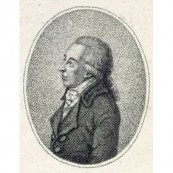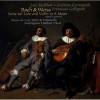Composers
Friedrich Wilhelm Rust (6 July 1739 – 28 February 1796) was a German violinist, pianist and composer.[1] He hailed from a renowned musical family in Germany.[2] He was the father of the pianist and organist Wilhelm Karl Rust and the grandfather of Thomaskantor, composer and Bach scholar Wilhelm Rust
He was born in Wörlitz near Dessau, Saxony-Anhalt on 6 July 1739. Encouraged to study violin, Rust was taught early on by his older brother, Johann Ludwig Anton, who was an accomplished musician with J.S. Bach's orchestra and played as a violinist in Leipzig.[2] Rust also studied piano, particularly the works of Johann Sebastian Bach; he was able to play his collection of preludes and fugues in all keys Das Wohltemperierte Clavier from memory at the age of 13[2] or 16, according to other sources.[2][4] His father, a princely Kammerrat and bailiff, died in 1751, and he moved with his mother and brother to Gröbzig.[1] He attended the Lutheran gymnasium in Cöthen beginning in 1755, and from 1758 took law at University of Halle.[1] During this period, he studied composition and organ with Wilhelm Friedemann Bach, who he described as "stingy with his art".[5] From 1762, he took music lessons with Carl Höckh in Zerbst, and with Carl Philipp Emanuel Bach and Franz Benda in Berlin and Potsdam.[1]
In 1765–66, he accompanied Leopold III, Duke of Anhalt-Dessau, on a trip to Italy. While there, he trained with Giovanni Battista Martini, Pietro Nardini, Gaetano Pugnani, Giuseppe Tartini and G. Benda.[2][1] He also became interested in the viola d'amore, for which he would compose at least nine pieces.[6]
In 1766, he returned to Dessau, where he worked as an educator and music organizer. He created a subscription concert series in 1769,[1] and on September 24, 1774, he founded an opera theatre.[2][7] In 1774, Rust was made court music director and married Henriette Niedhardt, a former pupil, who was a singer, with whom he had eight children.[1] His eldest son died in a drowning accident and his youngest son, Wilhelm Karl, became a well known music instructor.[2] He met Goethe in 1776, who was "deeply impressed" by the composer.[8] His Sonata per il Clavicordio all imitazione de Timpani del Salterio e del Liuto (1792) was considered interesting in part because of its imitation of the timpani by the tremolo effect.[9]
Rust died in Dessau on 28 February 1796, aged 56.
Refine by search
view allBiography
Friedrich Wilhelm Rust (6 July 1739 – 28 February 1796) was a German violinist, pianist and composer.[1] He hailed from a renowned musical family in Germany.[2] He was the father of the pianist and organist Wilhelm Karl Rust and the grandfather of Thomaskantor, composer and Bach scholar Wilhelm Rust
He was born in Wörlitz near Dessau, Saxony-Anhalt on 6 July 1739. Encouraged to study violin, Rust was taught early on by his older brother, Johann Ludwig Anton, who was an accomplished musician with J.S. Bach's orchestra and played as a violinist in Leipzig.[2] Rust also studied piano, particularly the works of Johann Sebastian Bach; he was able to play his collection of preludes and fugues in all keys Das Wohltemperierte Clavier from memory at the age of 13[2] or 16, according to other sources.[2][4] His father, a princely Kammerrat and bailiff, died in 1751, and he moved with his mother and brother to Gröbzig.[1] He attended the Lutheran gymnasium in Cöthen beginning in 1755, and from 1758 took law at University of Halle.[1] During this period, he studied composition and organ with Wilhelm Friedemann Bach, who he described as "stingy with his art".[5] From 1762, he took music lessons with Carl Höckh in Zerbst, and with Carl Philipp Emanuel Bach and Franz Benda in Berlin and Potsdam.[1]
In 1765–66, he accompanied Leopold III, Duke of Anhalt-Dessau, on a trip to Italy. While there, he trained with Giovanni Battista Martini, Pietro Nardini, Gaetano Pugnani, Giuseppe Tartini and G. Benda.[2][1] He also became interested in the viola d'amore, for which he would compose at least nine pieces.[6]
In 1766, he returned to Dessau, where he worked as an educator and music organizer. He created a subscription concert series in 1769,[1] and on September 24, 1774, he founded an opera theatre.[2][7] In 1774, Rust was made court music director and married Henriette Niedhardt, a former pupil, who was a singer, with whom he had eight children.[1] His eldest son died in a drowning accident and his youngest son, Wilhelm Karl, became a well known music instructor.[2] He met Goethe in 1776, who was "deeply impressed" by the composer.[8] His Sonata per il Clavicordio all imitazione de Timpani del Salterio e del Liuto (1792) was considered interesting in part because of its imitation of the timpani by the tremolo effect.[9]
Rust died in Dessau on 28 February 1796, aged 56.



